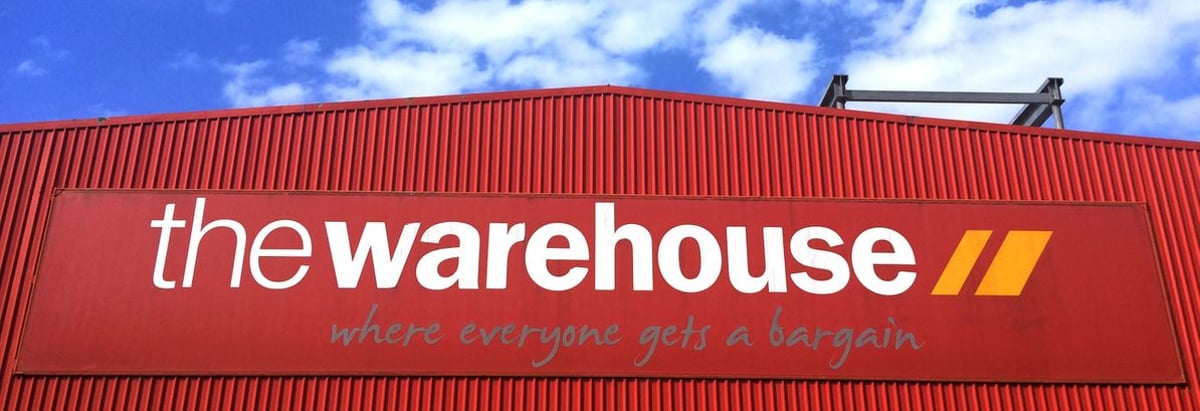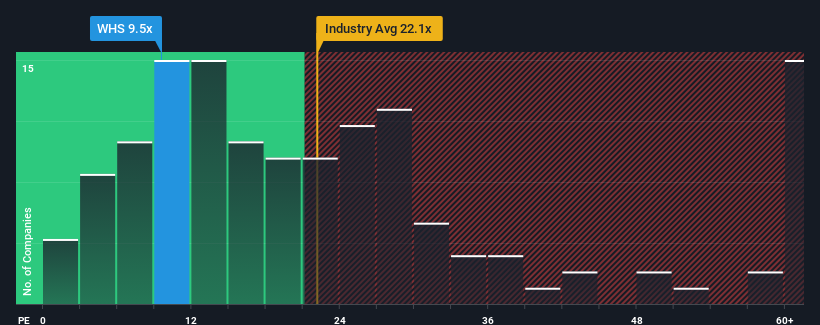The Warehouse Group Limited (NZSE:WHS) Looks Inexpensive But Perhaps Not Attractive Enough

With a price-to-earnings (or "P/E") ratio of 9.5x The Warehouse Group Limited (NZSE:WHS) may be sending bullish signals at the moment, given that almost half of all companies in New Zealand have P/E ratios greater than 15x and even P/E's higher than 31x are not unusual. Although, it's not wise to just take the P/E at face value as there may be an explanation why it's limited.
Recent times haven't been advantageous for Warehouse Group as its earnings have been falling quicker than most other companies. It seems that many are expecting the dismal earnings performance to persist, which has repressed the P/E. You'd much rather the company wasn't bleeding earnings if you still believe in the business. If not, then existing shareholders will probably struggle to get excited about the future direction of the share price.
See our latest analysis for Warehouse Group

Is There Any Growth For Warehouse Group?
In order to justify its P/E ratio, Warehouse Group would need to produce sluggish growth that's trailing the market.
If we review the last year of earnings, dishearteningly the company's profits fell to the tune of 44%. The last three years don't look nice either as the company has shrunk EPS by 45% in aggregate. Therefore, it's fair to say the earnings growth recently has been undesirable for the company.
Looking ahead now, EPS is anticipated to climb by 12% per annum during the coming three years according to the three analysts following the company. Meanwhile, the rest of the market is forecast to expand by 17% per year, which is noticeably more attractive.
In light of this, it's understandable that Warehouse Group's P/E sits below the majority of other companies. It seems most investors are expecting to see limited future growth and are only willing to pay a reduced amount for the stock.
What We Can Learn From Warehouse Group's P/E?
We'd say the price-to-earnings ratio's power isn't primarily as a valuation instrument but rather to gauge current investor sentiment and future expectations.
We've established that Warehouse Group maintains its low P/E on the weakness of its forecast growth being lower than the wider market, as expected. Right now shareholders are accepting the low P/E as they concede future earnings probably won't provide any pleasant surprises. It's hard to see the share price rising strongly in the near future under these circumstances.
There are also other vital risk factors to consider before investing and we've discovered 2 warning signs for Warehouse Group that you should be aware of.
If you're unsure about the strength of Warehouse Group's business, why not explore our interactive list of stocks with solid business fundamentals for some other companies you may have missed.
If you're looking to trade Warehouse Group, open an account with the lowest-cost platform trusted by professionals, Interactive Brokers.
With clients in over 200 countries and territories, and access to 160 markets, IBKR lets you trade stocks, options, futures, forex, bonds and funds from a single integrated account.
Enjoy no hidden fees, no account minimums, and FX conversion rates as low as 0.03%, far better than what most brokers offer.
Sponsored ContentValuation is complex, but we're here to simplify it.
Discover if Warehouse Group might be undervalued or overvalued with our detailed analysis, featuring fair value estimates, potential risks, dividends, insider trades, and its financial condition.
Access Free AnalysisHave feedback on this article? Concerned about the content? Get in touch with us directly. Alternatively, email editorial-team (at) simplywallst.com.
This article by Simply Wall St is general in nature. We provide commentary based on historical data and analyst forecasts only using an unbiased methodology and our articles are not intended to be financial advice. It does not constitute a recommendation to buy or sell any stock, and does not take account of your objectives, or your financial situation. We aim to bring you long-term focused analysis driven by fundamental data. Note that our analysis may not factor in the latest price-sensitive company announcements or qualitative material. Simply Wall St has no position in any stocks mentioned.
About NZSE:WHS
Warehouse Group
Engages in the operation of retail stores in New Zealand.
Adequate balance sheet and fair value.
Market Insights
Community Narratives




